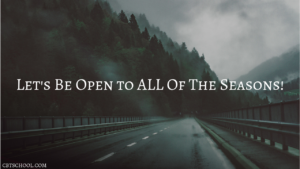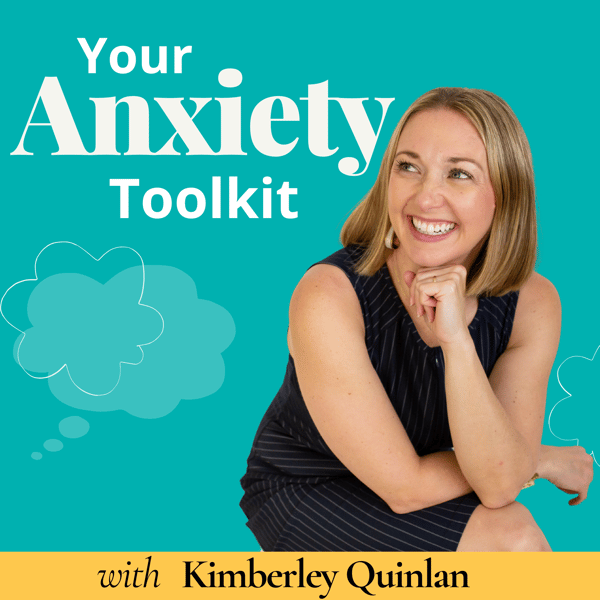Ep. 66: Seasonal Affective Disorder (SAD) is REAL and TREATABLE!
Your Anxiety Toolkit - Anxiety & OCD Strategies for Everyday
Kimberley Quinlan, LMFT | Anxiety & OCD Specialist
4.9 • 802 Ratings
🗓️ 14 September 2018
⏱️ 25 minutes
🧾️ Download transcript
Summary
Seasonal Affective Disorder (SAD) is REAL and TREATABLE!
 This podcast episode of Your Anxiety Toolkit is all about the Seasons. I have received a lot of requests to talk about changing seasons as we move from Summer to Autumn (here in the Northern Hemisphere). It isn’t just here. I am sure it is all around the world right now, as the seasons change from Winter to Spring for the Southern Hemisphere (Love you Australia!). There is no doubt that the seasons impact out mental health. In this week’s podcast, I look at a few important things to consider when managing anxiety, depression, OCD and other mental health issues. First let’s look at how the change in temperature impacts us on a Medical level. Seasonal Affective Disorder, also known as SAD, is understood to be a seasonal depression, affecting 5% of the population of US residents. Yes! It’s that high. If you are someone who is highly impacted by the temperature changes, you are definitely not alone. Seasonal Affective Disorder (SAD) can be treated with light therapy, outdoor activity and medication. Seasonal Affective Disorder isn’t just due to changes in seasons. It often occurs when daylight saving times changes and we “fall back," meaning we have less light during the day. When days get shorter, we have less time to get outdoors and move our bodies and soak up that glorious sunlight, which is linked to Seasonal Affective Disorder symptoms. We also know that colder weather can affect our circadian rhythms, causing us to have more depressive symptoms. When we are tired, we have less energy, causing us to feel down or sad or, in some cases, depressed. We also know that the season changes impact us on a Psychological level. We can also see changes in our thoughts. Negative thoughts can create depressive symptoms such as hopelessness, helplessness and worthlessness. Our job is to correct any negative or faulty thoughts so we are not so impacted by the weather or time changes. We can also be more mindful when these thoughts arise. In this episode, we also can look at the seasons from a metaphorical stand point. We need to be careful how we approach the seasons, similar to how we approach our emotions. We could consider some emotions as winter (like sadness and shame and guilt) and some emotions as summer (like happiness and joy and arousal). We could consider autumn being patience and letting go and shedding what doesn’t serve us. We could also consider spring a time where we feel free and hopeful and alive. Metaphorically, if we treat one season (environmentally or emotionally) like it is less than or worse than, we will in turn start to have aversion to it. In this episode, we talk about how to be open to all of the seasons, whether you enjoy them or not. Lastly, Exposure & Response Prevention (ERP) School for Obsessive Compulsive Disorder (OCD) is HERE! Exposure and Response Prevention School is an online, video-based course that teaches you the tools and skills I teach my clients in my office. The doors are only open to purchase ERP School from September 6th, 2018 until September 20th, 2018. Six more days!! We are so excited to share ERP with you and would love to have you join us and the CBT School community. Its a beautiful day to do hard things!
This podcast episode of Your Anxiety Toolkit is all about the Seasons. I have received a lot of requests to talk about changing seasons as we move from Summer to Autumn (here in the Northern Hemisphere). It isn’t just here. I am sure it is all around the world right now, as the seasons change from Winter to Spring for the Southern Hemisphere (Love you Australia!). There is no doubt that the seasons impact out mental health. In this week’s podcast, I look at a few important things to consider when managing anxiety, depression, OCD and other mental health issues. First let’s look at how the change in temperature impacts us on a Medical level. Seasonal Affective Disorder, also known as SAD, is understood to be a seasonal depression, affecting 5% of the population of US residents. Yes! It’s that high. If you are someone who is highly impacted by the temperature changes, you are definitely not alone. Seasonal Affective Disorder (SAD) can be treated with light therapy, outdoor activity and medication. Seasonal Affective Disorder isn’t just due to changes in seasons. It often occurs when daylight saving times changes and we “fall back," meaning we have less light during the day. When days get shorter, we have less time to get outdoors and move our bodies and soak up that glorious sunlight, which is linked to Seasonal Affective Disorder symptoms. We also know that colder weather can affect our circadian rhythms, causing us to have more depressive symptoms. When we are tired, we have less energy, causing us to feel down or sad or, in some cases, depressed. We also know that the season changes impact us on a Psychological level. We can also see changes in our thoughts. Negative thoughts can create depressive symptoms such as hopelessness, helplessness and worthlessness. Our job is to correct any negative or faulty thoughts so we are not so impacted by the weather or time changes. We can also be more mindful when these thoughts arise. In this episode, we also can look at the seasons from a metaphorical stand point. We need to be careful how we approach the seasons, similar to how we approach our emotions. We could consider some emotions as winter (like sadness and shame and guilt) and some emotions as summer (like happiness and joy and arousal). We could consider autumn being patience and letting go and shedding what doesn’t serve us. We could also consider spring a time where we feel free and hopeful and alive. Metaphorically, if we treat one season (environmentally or emotionally) like it is less than or worse than, we will in turn start to have aversion to it. In this episode, we talk about how to be open to all of the seasons, whether you enjoy them or not. Lastly, Exposure & Response Prevention (ERP) School for Obsessive Compulsive Disorder (OCD) is HERE! Exposure and Response Prevention School is an online, video-based course that teaches you the tools and skills I teach my clients in my office. The doors are only open to purchase ERP School from September 6th, 2018 until September 20th, 2018. Six more days!! We are so excited to share ERP with you and would love to have you join us and the CBT School community. Its a beautiful day to do hard things!Transcript
Click on a timestamp to play from that location
| 0:00.0 | This is Your Anxiety Toolkit episode number 66. |
| 0:09.6 | Welcome to Your Anxiety Toolkit. |
| 0:12.3 | I'm your host, Kimberly Quinlan. |
| 0:14.5 | This podcast is fueled by three main goals. |
| 0:17.4 | The first goal is to provide you with some extra tools to help you manage your anxiety. |
| 0:23.0 | Second goal, to inspire you. Anxiety doesn't get to decide how you live your life. And number three, |
| 0:29.7 | and I leave the best for last, is to provide you with one big, fat virtual hug, because experiencing |
| 0:37.1 | anxiety ain't easy. |
| 0:38.3 | If that sounds good to you, let's go. |
| 0:45.3 | Well, welcome back CBT school community. |
| 0:49.3 | I am so thrilled to have you here with me on this beautiful day. |
| 0:53.3 | Now a lot has been going on in the |
| 0:56.8 | world of CBT school, and I want to first start by saying thank you so much to everyone who |
| 1:03.6 | supported me and has been cheering me on as we continue on our launch of Exposure and Response Prevention School, |
| 1:14.2 | the online course for Exposure and Response Prevention Tools. |
| 1:19.0 | It has been a delight to hear the feedback and to hear people's excitement, and I have just |
| 1:26.6 | loved it. It's actually been a beautiful time of |
| 1:30.8 | reflection for me because it's done finally and I can actually stop and really, really be proud |
| 1:39.0 | of it and enjoy it and experience the excitement of releasing it out to the world. So I am just so thrilled and |
| 1:48.1 | honored and genuinely excited. Really, really I am. So if you're still interested, |
| 1:55.1 | the cart will still be open for another week. I think another eight days. We're closing on the 20th. There is a potential we |
| 2:03.2 | might keep it open until the 21st, but make sure you're getting in fast before the time runs |
... |
Please login to see the full transcript.
Disclaimer: The podcast and artwork embedded on this page are from Kimberley Quinlan, LMFT | Anxiety & OCD Specialist, and are the property of its owner and not affiliated with or endorsed by Tapesearch.
Generated transcripts are the property of Kimberley Quinlan, LMFT | Anxiety & OCD Specialist and are distributed freely under the Fair Use doctrine. Transcripts generated by Tapesearch are not guaranteed to be accurate.
Copyright © Tapesearch 2025.

